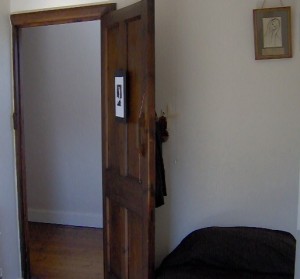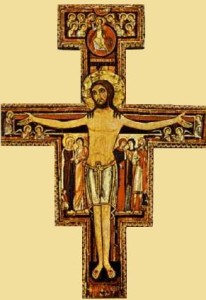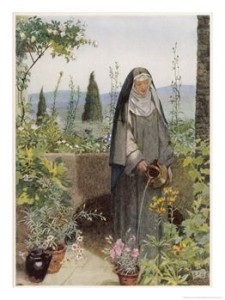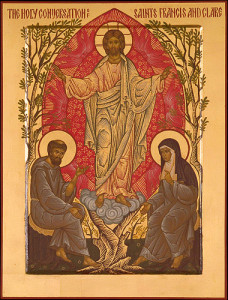|
|
Posted By Teresa Redder, on November 30th, 2015  Dear Sister and Brothers, Dear Sister and Brothers,
Pope Francis has called us to begin the Year of Mercy on the feast of the Immaculate Conception December 8th 2015 and end on November 20, 2016. He has made mercy the central theme of his papacy. In Evangelii Gaudium, The Joy of the Gospel, mercy is used 32 times.
This is what our holy father Pope Francis has had to say:
The Church should be more evident in its mission of being a witness of mercy. It is a call for each of us to give consolation to every man and woman of our time. No one can be excluded from the mercy of God.
The Church is the house that welcomes all and refuses no one, the pope said, Its doors remain open so that those touched by grace can find the certainty of Forgiveness.
The Church is in need of mercy during this year of mercy Let us never tire of asking Forgiveness.
We entrust it as of now to the Mother of Mercy as she looks with her gaze and watches over our way as Jesus would not deny anything that she asks.
Pope Francis wants us to live the upcoming Holy Year “in the light” of the Gospel of Luke – Be Merciful just as your Father is merciful.
REFLECTION: Saint Francis “A PRAYER INSPIRED BY THE OUR FATHER”
Forgiveness
Forgive us our trespasses through the ineffable mercy through the power of the passion of Your beloved Son and through the merits and intercession of the ever blessed Virgin and all Your elect.
As we forgive those who trespass against us and what we do not completely forgive, make us, Lord, forgive completely that we may truly love our enemies because of You and we may fervently intercede for them before You, returning no evil for evil and may we strive to help everyone in You.
Through this season of Advent let us apply this reflection to our daily lives as Franciscans. Even though we may not forget, let us let go of what ever grudge and/or animosity we may hold over another and consider what relationship may be in need of healing.
Let us pray,
May we seek to forgive as YOU forgive, for in forgiveness comes healing.
Let us extend our reconciliation to all we meet and be that Door of Mercy, opening wide to receive mercy and embrace peace.
May you have a blessed Advent season and a Holy and peaceful Christmas!
Much love,
Rosie
Posted By Teresa Redder, on November 1st, 2015 Franciscan Simplicity and Creation
 Our Franciscan Rule 11 states that Christ and His mother chose a poor and humble life, even though he valued created things attentively and lovingly. Let the Secular Franciscan seek a proper spirit of detachment from temporal goods and simplifying their own material needs. Our Franciscan Rule 11 states that Christ and His mother chose a poor and humble life, even though he valued created things attentively and lovingly. Let the Secular Franciscan seek a proper spirit of detachment from temporal goods and simplifying their own material needs.
The parable of the rich fool (Lk. 12: 16-21) is only interested in building his wealth and riches for his remaining years. He cares not for the treasures that only heaven can offer instead the treasures of life consume him. As he has been so busy storing earthly treasures he has not figured out if he would live long enough to enjoy what he has stored. The important line is the end of the verse which states that we should be rich in what matters to God.
In today’s world it is easy to get caught up in being consumed with money, gadgets and more are tempting when contrasted against corporal works of mercy, and a desire to grow in holiness. We are aware that satisfaction comes only through holiness and not from having more.
In scripture we read about the Pearl of great price in Mt 13:45-46 In searching for the pearl of great price we realize that none of our possessions can compare to the pearl of God’s love and graces.
In Rule 18 we read they should respect all creatures, animate and inanimate, which “bear the imprint of the Most High,” and they should strive move from the temptation of exploiting creation to the Franciscan concept of universal kinship.
We read in Genesis, that Humans are commanded to care for God’s creation and so we can apply this to our lives as Franciscans. What are some examples using Pope Francis encyclical, Laudato Si’ that apply to simplicity of our lives and caring for God’s creation?
God Bless,
Rosie
Posted By Teresa Redder, on October 3rd, 2015  Dear Brothers and Sisters, Dear Brothers and Sisters,
May the Peace of the Lord be with you!
I have had the privilege and pleasure of visiting Fraternities in our Region especially over the last three months. At some of the gatherings I sat in on formation lessons, others just for a visit to see what was going on and to offer any help needed. In a few fraternities I was part of the ongoing formation and I used the San Damiano Cross as the topic of instruction. Not only did Francis hear the Lord calling him to service but there are also so many other figures on the cross to learn about.
We examined each figure on the Cross and discovered that all the figures next to Jesus are the same size, the Mother of God and John under the protection of God’s hand, a small faced unidentified participant, and, among the many other figures, trying to find the Rooster was an especially graced moment, producing many laughs. The most interesting observation for me, however, was the discovery of the shells that go all around the outside of the cross. They symbolize the celebration of life from the depths of the deep to the highest heavens. » Click to continue reading “Thoughts from your Regional Formation Director – October 2015” »
Posted By Teresa Redder, on September 5th, 2015  Dear Brothers and Sisters, Dear Brothers and Sisters,
I have put together a program for the Newly Professed that you may like to use and I hope it will be helpful. I am always available for anyone who may have questions 732 408 6653 or perfectjoy112@gmail.com
A PROGRAM FOR NEWLY PROFESSED
This program for the Newly Professed is advocated by a mystagogia-type in the General Constitutions (Article 44.2) and the Guidelines for Initial Formation in the Secular Franciscan Order in the United States. (Chapter 3 F2.a.page 28) This phase gives the newly professed an opportunity to delve more deeply into the mysteries of Franciscan spirituality and to make the conversion process an integral part of their daily lives. The program begins with a theme, followed by an article of the Rule, a scripture reference, reflective silence, a Presentation, a Francis experience, keeping a journal, sharing and prayer. The text will be “To Live as Francis Lived.”
THEME: HUMILITY THE TWIN OF PROVERTY “TO LIVE as FRANCIS LIVED” CHAPTER 18
ARTICLE 12 Witnessing yet to the good yet to come and obliged to acquire purity of heart because of the vocation they have embraced, they should set themselves free to love God and their brothers and sisters.
Scripture Reference: Matthew 5:3 and John 15:5
Reflective Silence: quiet reflection on the passages selected.
Presentation: A presentation on Franciscan humility the twin of Poverty page 69-70
Francis experience: Read page 71 in text The Humility of Saint Francis
Journaling: Write about what St. Francis’ experience means to you.
Questions for Reflection: What is humility? What words best describe the ingredients of humility?
Discussion: Application in Daily Life, What saying of Saint Francis on humility has the most impact?
PRAYER: “Of myself I can do nothing.” I praise you and thank you, my Creator, for what you choose to do in and through me. Amen
Love and Peace,
Rosie
Posted By Teresa Redder, on August 2nd, 2015  Dear Sisters and Brothers, Dear Sisters and Brothers,
Last month our fraternity, St. Maximilian Kolbe had a Day of Recollection. Our speaker was Sr. Mary Frances OSC. The theme was “Rebuild My Church”
During this month of August we celebrate a few feast days starting with Our Lady of the Angels August 2nd “The Portincula”, then the feast day of St. Clare on the 11th and “The Assumption” on August 15th . Our Lady has a special place in our Franciscan way of life
It was the first time at least for me to hear someone give a talk about Clare beginning with Clare’s mother Ortulana. We learned about the prophecy of Clare that at one time Clare’s mother was to go on Pilgrimage and it was unheard of for a noblewomen of that time. If a noblewomen would be walking down the street, the other person would have to walk on the opposite side. It so happened that one day when Ortulana was praying before the crucifix, she heard a voice say, You will bear a Light, her name means Clare with shadowed light.
After her family returned from Perugia in 1202 Clare received the education of a gentlewoman and in her later life she described herself as “a worthless handmaid.”
When she was about 12 years old, Francis son of that merchant class which once had driven her family out, suffered his bewildering conversion. Clare in her testament wrote that before Francis had as much as one brother, sang out prophetically in French whilst rebuilding San Damiano “Come help me in the work of building the Monastery of San Damiano because ladies are yet to dwell here who will glorify our heavenly Father throughout His holy Universal Church by their holy and celebrated manner of life.
On Palm Sunday in 1212, Clare went to church in her best clothes. When the distribution of palms took place she did not go forward at that moment. Perhaps she was filled with fear understanding the meaning of the palm, a symbol of martyrdom. Clare wandered and passed through a little used door in her palazzo which some thought that only the dead alone were carried out. She ran down the hill to Our Lady Of the Angels where Francis and his brothers waited for her. Clare’s hair was cut and she received the habit of the lesser brothers. Clare was then sent to a near home in Bascia which was the home of Benedictine women. The next morning her relatives came and tried to persuade Clare with threats and every means to get her back going as far as employing violent force with poisonous promises(Legend of Clare 9)
After the death of Pope Gregory lX both Clare and Agnes (who rejected the hand of Emperor Frederick ll in order to follow her vocation) separately entreated the Holy See for a more authentic rule of life but began to write her own rule but was not successful. Around the year 1250 Clare began to write her own rule. Clare was the first women to do so. It was presented to Pope Innocent lV as Clare neared her death. The Holy Father was in Perugia along with Cardinals and came to visit Clare. When she asked for absolution from her sins, he said with tears, “Would that I had as little need of absolution as you” Finally the confirmation of Clare’s rule was signed which was endorsed by the Papal Bull.
May we as Franciscans be the Mirror as Clare was and as Francis to help rebuild the church as a family rooted in the love of Christ and Our Mother Mary Mother of the Church.
What part of Francis and Clare’s life motivates you to move to conversion? How can we be the mirror of Christ so that others will see the Jesus in us?
A quote from Benedict XVl: Do not be afraid to say “yes” to Jesus to find joy in doing His will giving yourself completely to the pursuit of holiness and using our talents in the service to others.
Peace,
Rosie
Posted By Teresa Redder, on July 4th, 2015 Dear Brothers and Sisters,
I hope you are enjoying the summer. Hope you get to read Pope Francis’s New Encyclical
“Praised Be You.” In the spirit of Pope Francis’s Encyclical, let us take a look at one of St. Francis’s prayers The Canticle of the Creatures and our Rule.
In the Canticle of the Creatures Francis praises God for all God’s creation, the sun, moon, stars etc. and addresses them all as brother and sister brought into being by the same Father. For Francis each creature, animate or inanimate, was a sign and reminder of God’s presence to us.
Article 18 of our Rule 18 states, “Moreover they should respect all creatures animate and inanimate which bear the imprint of the Most High, and they should strive to move from the temptation of exploiting creation to the Franciscan concept of universal kingship.” This concept of universal kinship is a unique attribute and makes the Franciscan charism different from other Orders within the Church that have a Rule of Life addressing Integrity of Creation. » Click to continue reading “Thoughts From Your Regional Formation Director – July, 2015” »
Posted By Teresa Redder, on June 1st, 2015 Pope Francis on the Eucharist![2845_250[1]](http://www.skdregion.org/wp-content/uploads/2845_2501-150x150.gif)
The Eucharist: Source and Summit of the Church’s Life
In his recent series of teachings on the Sacraments of the Church, Pope Francis dedicated two Wednesday audiences and a homily to exploring the nature the Eucharist, its centrality to the Church’s very identity, its application in our lives, and how the celebration of the Eucharist rediscovers and revitalizes the “sense of the sacred.”
“In the Eucharist, Christ is always renewing His gift of self, which He made on the Cross,” the pope said. “His whole life is an act of total sharing of self out of love.”
“It is so important to go to Mass on Sunday,” Pope Francis spontaneously added to the text of his February 5 audience, “not just to pray, but to receive Communion. It is a beautiful thing to do,” he said, for Sunday is “precisely the day of the resurrection of the Lord. That is why Sunday is so important to us.”
Rediscover a “Sense of the Sacred” at Mass
February 10 Homily Excerpts
The first Reading of the day speaks of the “theophany” of God in the time of Solomon the king. The Lord came down like a cloud upon the temple, which was filled with the glory of God. The Lord, the pope said, speaks to His people in many ways: through the prophets, the priests, the Sacred Scriptures. But with the theophanies, He speaks in another way, “different from the Word: it is another presence, closer, without mediation, near. It is His presence.” This, he explained, happens in the liturgical celebration. The liturgical celebration is not a social act, a good social act; it is not a gathering of the faithful to pray together. It is something else. In the liturgy, God is present,” but it is a closer presence. In the Mass, in fact, “the presence of the Lord is real, truly real.”
“When we celebrate the Mass, we don’t accomplish a representation of the Last Supper: no, it is not a representation. It is something else: it is the Last Supper itself. It is to really live once more the Passion and the redeeming Death of the Lord. It is a theophany: the Lord is made present on the altar to be offered to the Father for the salvation of the world. We hear or we say, ‘But, I can’t now, I have to go to Mass, I have to go to hear Mass.’ nto the mystery of God, to allow ourselves to be brought to the mystery, and to be in the mystery,” he said. We are all “gathered here to enter into the mystery: this is the liturgy. It is God’s time, it is God’s space, it is the cloud of God that surrounds all of us. To celebrate the liturgy is to have this availability to enter into the mystery of God,” to enter into His space, His time, to entrust ourselves to this mystery.
Pope Francis concluded, “We would do well today to ask the Lord to give to each of us this The Mass is not ‘heard,’ it is participated in; and it is a participation in this theophany, in this mystery of the presence of the Lord among us.”
Nativity scenes, the Way of the Cross… these are representations. The Mass, on the other hand, “is a real commemoration, that is, it is a theophany: God approaches and is with us, and we participate in the mystery of the Redemption.” Unfortunately, too often we look at the clock during Mass, “counting the minutes.” This, the pope said, is not the attitude the liturgy requires of us: the liturgy is God’s time, God’s space, and we must place ourselves there: in God’s time, in God’s space, and not look at the clock.”
“The liturgy is to really enter into the mystery of God, to allow ourselves to be brought to the mystery, and to be in the mystery,” he said. We are all “gathered here to enter into the mystery: this is the liturgy. It is God’s time, it is God’s space, it is the cloud of God that surrounds all of us. To celebrate the liturgy is to have this availability to enter into the mystery of God,” to enter into His space, His time, to entrust ourselves to this mystery.
Pope Francis concluded, “We would do well today to ask the Lord to give to each of us this ‘sense of the sacred’ — this sense that makes us understand that it is one thing to pray at home, to pray in Church, to pray the Rosary, to pray so many beautiful prayers, to make the Way of the Cross, so many beautiful things, to read the Bible — [but] the Eucharistic celebration is something else. In the celebration we enter into the mystery of God, into that street that we cannot control: only He is the unique One — the glory, the power — He is everything.
“Let us ask for this grace: that the Lord would teach us to enter into the mystery of God.”
Saint Francis in his Admonition 1 – “As He revealed Himself to the holy apostles in the true flesh, so He reveals Himself to us now in sacred bread. And as they saw only His flesh by an insight of their flesh, yet believed that He was God as they contemplated Him with their spiritual eyes. let us, as we see bread and wine with our bodily eyes, see and firmly believe that they are His most holy Body and Blood living and true.
Let us pray as Saint Francis “My God and my all”
Peace and every good,
Rosie
Posted By Teresa Redder, on May 2nd, 2015  Dear Brothers and Sisters, Dear Brothers and Sisters,
In the beautiful prayer Saint Francis wrote in a letter to the Order we can see the three essential steps in our spiritual life which Francis himself embellished. This prayer can be found in our Ritual on page 36 that is our Closing Prayer.
As we grow in relationship with Christ we begin to understand the mysteries of our faith beginning with the purgative way which is a purification, a self emptying. This does not happen through our own efforts but only by the grace that God gives to us.
As we descend, we arise to an awakening to a deeper level of our faith to the illuminative way in which we meet Christ in a more personal way. We address our moral way of life and overcome that barrier and surrender ourselves to our loving Lord. We then ascend and decrease in our driven needs to the unitive way.
Almighty, just and merciful God, addresses God and describes our spiritual life. It teaches us mercy. We will be opening the door of Mercy this year on December 8th.
Grant us in our misery…… We are in a miserable state, darkened emotions. A need for reparation.
And always want what pleases you…..”If you love me keep my commandments.”
So that cleansed and enlightened interiorly….the purgative way
And fired with the flame of the Holy Spirit purgation, conversation of the will.
You who live and rule in perfect Trinity and simple Unity…unitive way
Let us pray,
Almighty, and eternal, just and merciful God:
Grant us in our misery that we may do for your sake alone what we know you want us to do, and always want what pleases you; so that cleansed and enlightened interiorly and fired with the flame of the Holy Spirit, we may be able to follow in the footsteps of your Son, our Lord Jesus Christ, and so make our way to you, Most High, by your grace alone , you who live and rule in perfect Trinity and simple Unity, and are glorified, God all powerful, forever and ever. Amen.
Peace and every good,
Rosie
Posted By Teresa Redder, on April 4th, 2015  Dear Brothers and Sisters, Dear Brothers and Sisters,
May the Peace of the Risen Lord be with you all!
As we celebrate the Resurrection of our Blessed Lord, let us joyfully keep on the path of conversion, clearly this is not the end.
Let us touch on the topic about Contemplation and how it is a means of a deeper love and seeing all things in the true relation to God as Francis and Clare.
We should spend more time building our relationship with God. Let us use Francis and Clare as a model to apply to our daily lives. Francis became like Christ but it took prayerful contemplation and action. Francis understood that the Holy Spirit was not just a source of power but also that the Holy Spirit inspires us with a love relationship of the most Holy Trinity.
Clare’s vision of contemplation begins with the mirror of the crucified Christ. She advised Agnes to see herself in the mirror each day. Clare provides a path to contemplation by daily prayer before the crucifix.
As Ilia Delio, OFS, writes in “Franciscan Prayer” The progression of prayer that leads to contemplation begins with the gaze on the crucified Christ and continues to penetrate the depths of reality until the one who gazes comes to see the heart of charity hidden in the heart of Christ. Not all of us follow the same approach to God. Through the eyes of Francis we see how he envisioned God and imitation of Jesus in relationship to God.
Article 8 of our Rule tells us, As Jesus was the true worshipper of the Father, so let prayer and contemplation be the soul of all they are and do. How does prayer lead you to the vision of contemplation? What prevents you from this vision?
Let me close with this writing of St. Bonaventure from The Major Legend of St. Francis:
Aroused by everything to divine love,
He rejoiced in all the works of the Lord’s hands
And through their delightful display
He rose into their life-giving and cause.
In beautiful things he contuited Beauty itself.
And through the footprints impressed in things
He followed the Beloved everywhere,
Out of them all making for himself a ladder
Through which he could climb up to lay hold of him.
Who is utterly desirable.
Peace and every good,
Your sister, Rosie
Posted By Teresa Redder, on March 1st, 2015 Dear Sisters and Brothers,![assisi09%20021[1]](http://www.skdregion.org/wp-content/uploads/assisi09-0211-225x300.jpg)
Peace and all good to you!
It is said that father Francis who, when in prison, started his conversion, took the words of the Gospel of Mark 6:7-13 literally. Jesus summoned the Twelve and began to send them out two by two and gave them authority over unclean spirits. He instructed them to take nothing for the journey but a walking stick – no food, no sack, no money for their belts.
St. Francis took the Lenten season very seriously, as we read in Chapter 7 The Little Flowers of Francis of Assisi, a new translation by Robert H. Hopcke and Paul A. Schwartz:
Saint Francis, true servant of Christ, was in many ways like Christ himself, given to the world for the salvation of all people. Thus, God willed that Saint Francis conform to the example of his only son Jesus Christ in his choice of twelve companions, as we have seen, in the wondrous mystery of the Sacred Stigmata, and in his Lenten fasting, which he observed in the following manner.
Having been lodged at the house of a faithful follower near the Lake of Perugia during the time of Carnival, Saint Francis was inspired by God to observe Lent that year on one of the islands in the lake. So Saint Francis asked his devoted son, for the love of God, to take him on Ash Wednesday in his boat to the uninhabited island by night, so that no one might see them, which the man did readily out of the great love and devotion he held toward Saint Francis. Bringing with him only two small loaves of bread, Saint Francis enjoined his friend to tell no one that he was there and to come back for him no sooner than Holy Thursday, at which his friend took leave of the island, leaving Saint Francis there by himself.
As there were no houses on the island to be used as shelter, Saint Francis was content to use a large, thick bush overgrown with vines and plants as a kind of den or hut for himself. There he prayed and contemplated heavenly matters, staying there throughout all of Lent without food or drink, eating no more than half of one of the small loaves he had brought with him, and his faithful friend found him on Holy Thursday upon his return to the island. Upon seeing a loaf and a half of bread still untouched, he believed that the saint ate the half loaf he did eat out of sheer reverence for the fasting of the blessed Christ, who ate nothing for forty days and forty nights, wishing to follow the example of Christ’s fast but setting aside any temptation to vainglory by eating this half loaf of bread as an act of intentional humility.
Afterward, God began to perform miracles in this place where Saint Francis had observed his Lenten abstinence in such a wondrous fashion. People came to this island, building houses and living there, until finally a town grew up, along with a community house for the friars, and all in this place where Saint Francis observed Lent felt great devotion for him and reverence.
Praise be to Jesus Christ and to his poor servant Francis. Amen.
For the remainder of Lent let us pray with joyful hearts, giving to those in need and denying ourselves so that we as Franciscans, who share in the cross, can share in the glorious resurrection on Easter Sunday. Glory be to God.
For further reflection, be sure to read Pope Francis’ Lenten Message, Make Your Hearts Firm. The message was signed on Oct. 4th, 2014, the feast of St. Francis of Assisi. Pope Francis makes reference to three Biblical texts which applies to the above and ourselves as the Church and Franciscans.
Love, Rosie
|
|










![2845_250[1]](http://www.skdregion.org/wp-content/uploads/2845_2501-150x150.gif)


![assisi09%20021[1]](http://www.skdregion.org/wp-content/uploads/assisi09-0211-225x300.jpg)